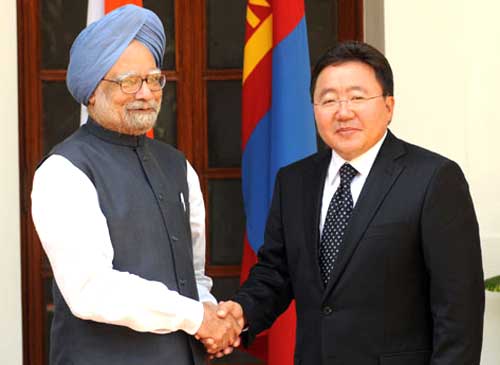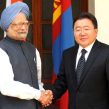
Asian Neighbors React to Mongolian Presidential Election
Publication: Eurasia Daily Monitor Volume: 10 Issue: 143
By:

Mongolia is in the midst of its traditional summer holiday slumber following its national naadam celebration from July 9–11. But the fact that Tsakhiagiin Elbegdorj of the Democratic Party won a second term as president of Mongolia on June 26 (see EDM, July 8) has both calmed the nerves of its Asian neighobors’ investors and spurred some governments to move even quicker to develop new avenues to exploit Mongolia’s income derived from its vast mineral resources. The Koreas and India, as well as Japan and Australia, see themselves as profiting from his victory, while China and Russia, the two border neighbors, are discomforted by the election results.
During his first administration, Elbegdorj established strong ties to both the Republic of Korea (ROK—South Korea) and the Democratic People’s Republic of Korea (DPRK—North Korea). Several days after the election, Lee Sikoo, CEO of South Korea’s Kyeryong Group, paid an official visit to Mongolia to discuss major construction projects for redevelopment of the capital city and national highways. Kyeryong will construct a 365-kilometer highway between Ulaanbaatar and the northern border town of Altanbulag—the site of a Mongolian-Russian free trade zone. The Korean company runs construction projects in Russia, South Asia and the Persian Gulf (ubpost.mongolnews.mn, July 7). On July 26, the ROK’s Korean Trade-Investment Promotion Agency (KOTRA) launched its “KOTRA-Ulaanbaatar” Business Center, “designed to strengthen economic cooperation between Mongolia and South Korea, to increase foreign trade demand and also support South Korean businesses and manufacturers to invest and operate in Mongolia…” (infomongolia.com, July 20).
Meanwhile, presidential national security and foreign policy advisor Lundeg Purevsuren was in Pyongyang on July 15–16 to discuss bilateral cooperation (KCNA, July 17). This visit is a continuation of Elbegdorj’s policy to deepen connections with the DPRK regime through cooperation in trade, IT and human exchanges. In June, HBOil JSC, a Mongolian oil trading and refining company, acquired 20 percent of North Korea’s not yet fully operational Sungri refinery in the Rason City Special Economic Zone. HBOil will bring Mongolian crude via Russia to Sungri, which will export the refined products back to Mongolia. This investment is part of Mongolia’s plan to end its energy dependency on Russia and China and develop the DPRK’s east coast Rajin port city to reach Asian customers. On July 4, in Pyongyang, the two countries signed an agreement on IT exchanges and cooperation. Mongolian livestock experts also are working to develop massive stockbreeding grass zones by reclaiming the Sepho plateau in North Korea’s Kangwon Province. The Mongolian Ministry of Labor reported that, as of April 2013, 1,749 North Koreans are working legally in Mongolia (in textiles and construction). This is second to 5,976 Chinese foreign workers (Yonhap News Agency, North Korea Newsletter No. 271, July 18).
Mongolia and India signed a comprehensive partnership agreement in September 2009 when Elbegdorj made India his first overseas visit upon becoming president. At his second inaugural, the Indian Minister for New and Renewable Energy Farooq Abdullah presented Elbegdorj with an invitation from President Pranab Mukherjee to again visit India. The Indian ministry’s press release stated: “The government’s decision to [send] a senior Cabinet Minister to the President’s inauguration underlines the importance that India places on further strengthening its bilateral relations with Mongolia” (IBNS, July 16). During his trip, Abdullah also met with Mongolia’s Foreign Minister Lu Bold and Minister of Environment Sanjaasuren Oyun.
Elbegdorj’s oath-taking ceremony was attended by ministerial-level delegations from Russia, Japan, China and France. His re-election was not a surprise, although commentary in the foreign media did not mention that his percentage of the vote in the three-way contest slipped a full percentage point from his 2009 victory. His 50.23 percent was just over the threshold needed to avoid a runoff, but was not so overwhelming as to permit him to push forward policies that go against the electorate’s rising tide of “resource nationalism.” It would be a mistake to see Elbegdorj as receiving a mandate for easing the regulatory environment for foreign investors. Rather, his re-election likely will mean that he will accelerate his anti-corruption initiatives targeted mainly toward opposition party officials and continue to rebalance the Chinese monopoly in foreign investment and trade through a diversification of foreign trade partners and the strengthening of domestic upstream technical capacity. Thus, negotiations with foreign investors will continue to be complicated.
Evidence of Mongolia’s direction is seen in the continuing dispute around Oyu Tolgoi (OT), a giant deposit expected to produce annually 1.2 billion pounds of copper worth over $4 billion, 650,000 ounces of gold worth $800 million, and 3 million ounces of silver worth some $100 million. Commercial production of the first 40,000 metric tons of copper concentrate destined for China was ready for transport in early June, but was held up throughout the election campaign period by Mongolian customs authorities. OT, 66-percent owned by Anglo-Australian Rio Tinto and Canadian Turquoise Hill Resources and 34-percent owned by the Mongolian government’s Erdenes Oyu Tolgoi (EOT), is seen as the linchpin for accelerating foreign investment. When shipments began moving on July 9, the relieved international financial community presumed that Elbegdorj’s government and Rio Tinto had agreed that sales revenue would funnel through the Mongolian banking system as Minister of Mines Davaajav Gankhuyag had demanded at his June 28 press conference (infomongolia.com, July 18). However, EOT continues to claim that there are “22 points of dispute” with Rio Tinto involving cost overruns, funding of a feasibility study for a $5 billion Phase Two underground expansion, employment and pay of Mongolian workers, and repatriation of earnings (english.news.mn, July 18). It is possible that Mongolia’s decision to allow the shipments is linked to low revenues in the 2013 State Income Fund because of the export delay, which could cause a 60-percent fall in GDP (ubpost.mongolnews.mn, July 7).
Another disappointment for foreign investors, especially China and Russia, was the July 19 announcement that three Mongolian firms would be given a one-year contract to start mining the West Tsankhi block of the enormous Tavan Tolgoi (TT) coal mine (miningweekly.com, July 19). This track was awarded in 2011 to an international consortium including China’s Shenhua Group, Russian Railways (RZHD), and the United States’ Peabody Energy, but was delayed when Japanese and South Korean bidders protested. OT copper and TT coal production are tied to the Mongolian parliament’s estimate that the country’s foreign trade balance will be positive in 2014—for the first time in five years. While President Elbegdorj’s re-election should bring about a reduction of China’s monopoly over Mongolia’s exports and of dependence on Russian energy, his plans involve greater reliance on Russian rail transport to reach new Asian customers.




